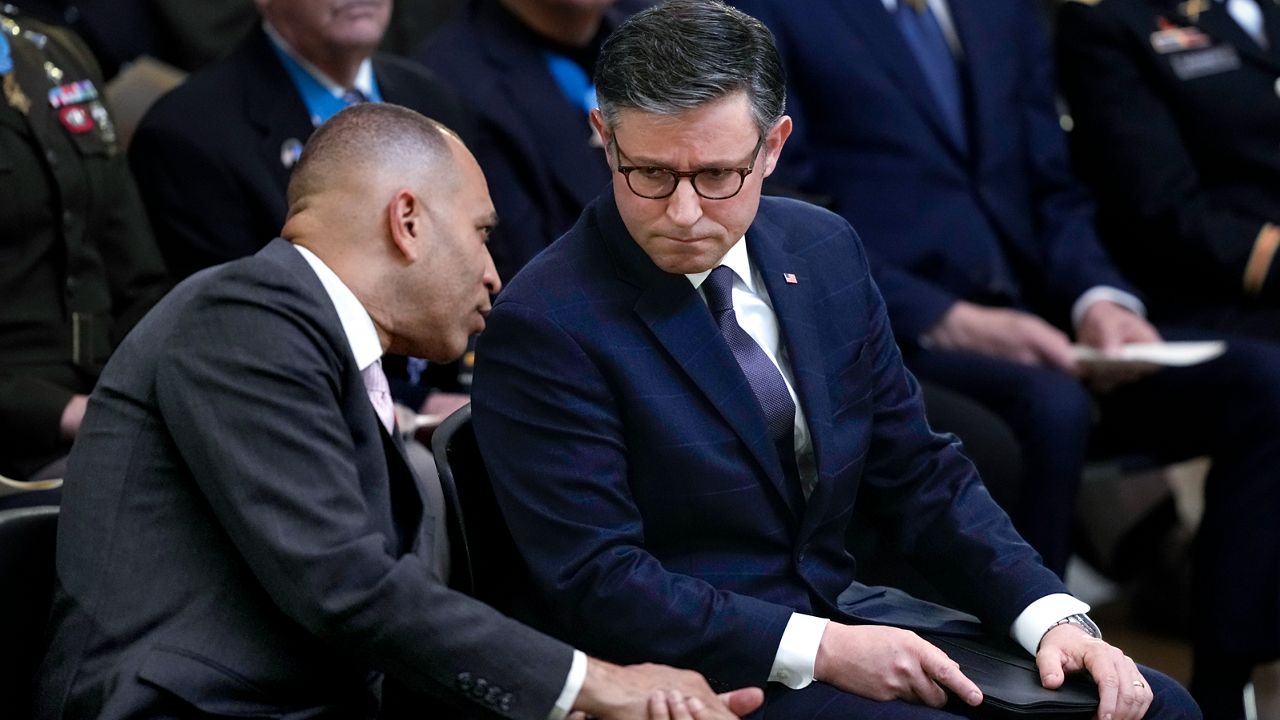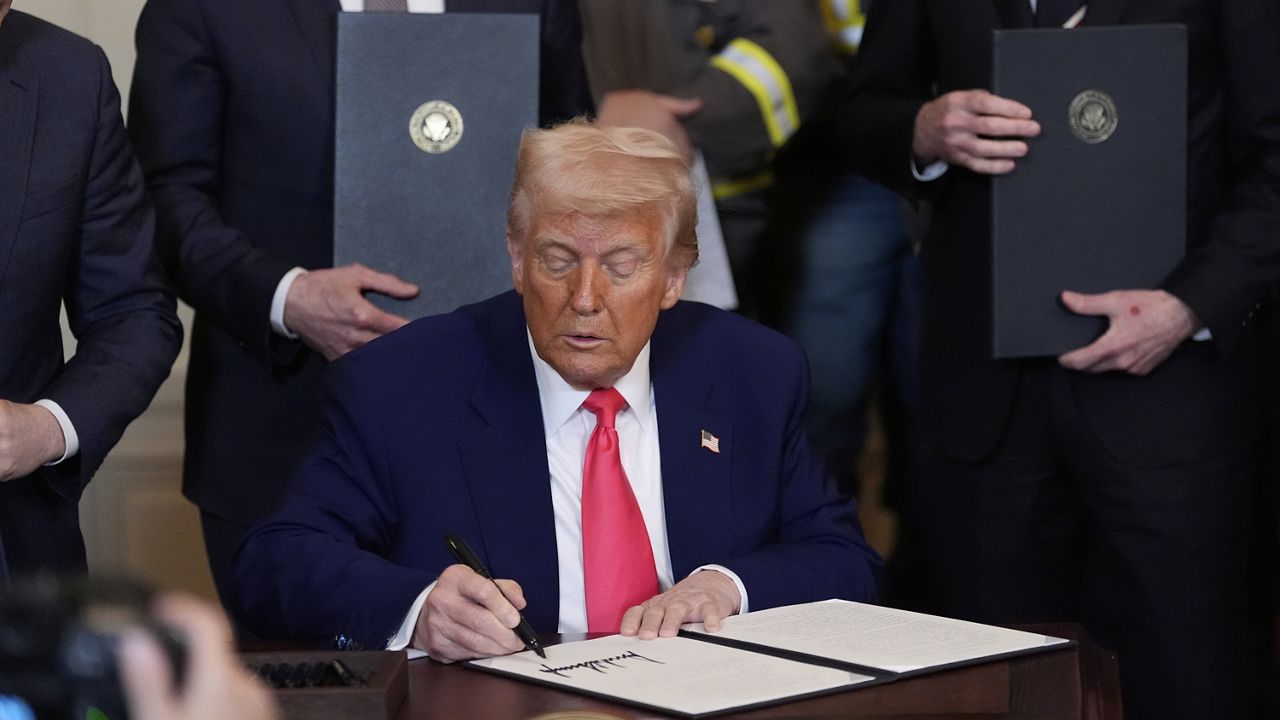With the future of additional U.S. aid to Ukraine hinging on the GOP-controlled House, President Joe Biden on Monday said he would be open to meeting with Speaker Mike Johnson, R-La.
“Sure, I’d be happy to meet with him if he has anything to say,” Biden told reporters on the White House South Lawn after returning from Delaware.
The willingness marked a potential new front in the stalemate after the White House had said there was nothing new to negotiate in response to Johnson last week saying he has been requesting a one-on-one sit-down with the president. The White House emphasized that the bipartisan border deal that the GOP originally insisted be tied to Biden’s foreign aid request had already been shot down by Republicans.
But the president on Monday also went on to accuse Republicans of “walking away” from the “threat of Russia,” NATO and America’s obligations.
“It's just shocking. I mean, they’re wild,” Biden said. “I’ve never seen anything like this.”
Biden said he hopes Russian opposition leader Alexei Navalny’s death on Friday, which the president blamed on Russian President Vladimir Putin, makes a difference in persuading the chamber to pass aid.
“They’re making a big mistake not responding,” he said.
It comes as the impasse in Washington over international aid has led the White House to lean further into a new angle to try to get Republican lawmakers and the public on board with the funding -- pointing out that assistance to Ukraine is resulting in money being spent in the United States.
Biden – who, when seeking to explain the need for the U.S. to support Ukraine, often highlights the fight for democracy and the threat of Russia expanding the war and leading the U.S. into a direct conflict – tried his hand at emphasing that point last week during a speech in which he pleaded with Johnson to put the Senate foreign aid bill on the floor for a vote.
“I want to be clear about something, because I know it’s important to the American people: While this bill sends military equipment to Ukraine, it spends the money right here in the United States,” Biden said, in what could be seen as an appeal to some Republicans who argue the U.S. cannot afford to keep sending money to the country and should focus on our own needs first.
“The way it works is we supply Ukraine with military equipment from our stockpiles, and then we spend our money replenishing those stockpiles so our military has access to them — stockpiles that are made right here in America by American workers,” Biden added.
The Department of Defense has put out infographics laying out the money being spent in each state to expand production and replenishes equipment.
“I think a lot of people don’t realize this money is spent here to replenish the stocks we’ve already sent over to Ukraine,” National Security Council spokesperson Adrienne Watson said in an interview with Spectrum News.
“So we are rebuilding our stocks with, in many cases, better equipment and material than what we had – newer certainly, and we’re doing it in 40 of the 50 states already across the country where we are expanding production lines and hiring workers who are making the weapons.”
In Florida, for instance, the state is making critical parts like javelins, parts of Abrams tanks, parts of amour and more, Watson said.
“These are very well-made critical materials that Ukraine has asked for that have made a huge difference on the ground already,” Watson said.
“It’s something where because we are able to see the impact that they make on the ground, we are also able, as we produce more to replenish our own stock, to see how they’re used in real life because a lot of these things has not been used as widely before until this conflict,” she said.
"Right now, we have workers, American workers, in more than 40 states across our country, who every day are producing weapons and equipment that had previously been going into Ukraine to help Ukrainian soldiers on the frontlines for freedom," Sean Savett, deputy spokesman for the National Security Council, said in a separate interview with Spectrum News on Tuesday.
"We have workers in Alabama producing Javelins [surface-to-air missiles], we have workers in Texas, Pennsylvania, Michigan, producing artillery shells, we have workers in West Virginia producing rockets, workers in Ohio producing tanks," Savett continued. "Those are all weapons and equipment that are American-made, that we're then sending to Ukraine after to help them defend themselves. And that's money that's been invested in the American economy, and putting American workers back to work."
"What's in this bill now is more funding to do just that, to hire more American workers, to produce more goods and equipment, that we can then send to Ukraine to help them fight this battle, which is in our own national security interests," he added. "Beyond that, it also is ... funding that helps our own military readiness because it enhances our own defense-industrial base. So the costs are not only high for Ukraine, but the costs are high for us, we will be sacrificing our own American military readiness and investments in our own ability American military-industrial base if ifCongress does not pass this bill."
On Tuesday of last week, the Senate passed a $95 package providing aid to Ukraine amid Russia’s invasion, Israel as it battles Hamas, the Indo-Pacific as China exerts its influence in the region and more.
The GOP originally insisted the foreign aid must be tied to substantial border policy changes in order to get the party’s support – setting in motion months of arduous negotiations between a bipartisan group of senators and the White House. But the final product from those talks – an overhaul of border and asylum policies coupled with the foreign aid – was quickly shot down by enough Republicans to kill it, leading the Senate to drop the border provisions and move forward with just foreign assistance.
Johnson has not committed to putting the package up for a vote as he has criticized it for not addressing the border. He criticized the bipartisan border deal that came out of the upper chamber.
Spectrum News' Kevin Frey and Corina Cappabianca contributed to this report









